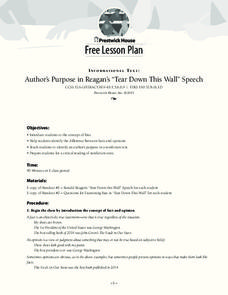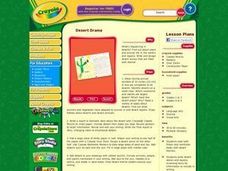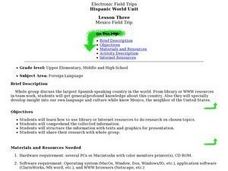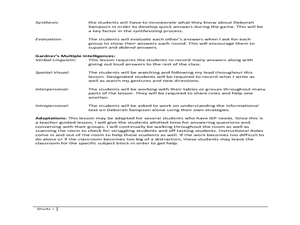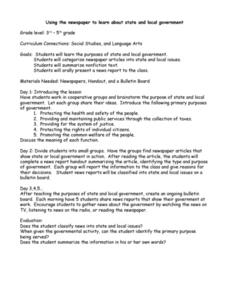Curated OER
Analyzing Irony in Nonfiction
Young scholars examine the use of irony in non-fiction works. In this literature lesson, students read non-fiction war texts and explore the use of irony in the piece as they respond to discussion questions.
Prestwick House
Author’s Purpose in Reagan’s “Tear Down This Wall” Speech
President Ronald Reagan's "Tear Down This Wall" speech, delivered on June 12, 1987 before the Berlin Wall, provides class members with an opportunity to examine three key aspects of informational text: author bias, the use of facts and...
Curated OER
Persona in Autobiography
A talkative old man? A naïve believer in Human Perfectibility? A Sage? Who is this guy, anyway? The Autobiography of Benjamin Franklin launches a study of the way Franklin uses structure, style, and purpose, as well as different...
Curated OER
Desert Drama
Students read both fiction and nonfiction books with desert themes. Then they write desert stories and reports, reviewing texts for information to include in writing. Students also design desert scenes with details and setting elements...
Curated OER
Cattle Drive
Students explore cattle drives. For this United States history and letter writing lesson, students write a letter to their family predicting possible problems that were encountered by participants in cattle drives. Students design...
Curated OER
Guided Reading: Desert Life
First graders read a book with the teacher while encountering unfamiliar words and learning how to use context clues and visual clues to understand the material. In this reading comprehension lesson plan, 1st graders...
Curated OER
Review of Literary Devices
Sixth graders review literary devices. They use both fiction and nonfiction texts to review metaphor, simile, alliteration, imagery, symbolism and personification. This lesson plan has a scripted guide for the teacher to follow.
EngageNY
Synthesizing Research: How Colonists Were Interdependent
Following the formative assessment of this unit, young scholars present the information they gathered on their specific colonial trade to the rest of the class. Working in groups, learners create posters describing the particular job...
Curated OER
Fiction and Nonfiction
Fourth graders differentiate between fiction and nonfiction using the books "Sarah Plain and Tall" and "A Day in the Prairie." They develop a list of information that they learn from the text, and create an information web. Students...
Curated OER
Reading And Responding: Lesson 15 Nonfiction
Eighth graders examine a nonfiction selection in a teacher led lesson plan. They examine the author's purpose for writing the selection and identify the difference between fact and opinion. The compare and contrast expository and...
Curated OER
Library Lesson Plan
Explain the differences between fiction and non-fiction and the characteristics of a biography. Learners analyze three pieces of literature on the same topic to determine which is fiction and which is non-fiction. In the end, relate the...
Maryland Department of Education
The Concept of Diversity in World Literature Lesson 4: Proverbs
"Eneke the bird says since men have learnt to shoot without missing, he has learnt to fly without perching." As part of their study of Things Fall Apart, class members read Paul Hernadi and Francis Steen's essay, "The Tropical Landscapes...
EngageNY
Grade 12 ELA Module 1: Unit 1, Lesson 1
Here's a fresh approach to the dreaded personal narrative required by most college applications. The Autobiography of Malcolm X is the anchor text for a unit that, through modeling and guided practice exercises, encourages the...
Scholastic
The First Thanksgiving Feast for Grades 6–8
It's time for the feast! Young historians complete their study of the First Thanksgiving by completing an online activity, watching a slideshow, and examining a First Thanksgiving timeline. After answering text-dependent questions to...
Curated OER
Review Parts of a Book
Begin the year with a review of the parts of a book. Exercises in the unit plan ask emergent readers to identify the information on the cover of a book and on the title page, to explain the purpose of a table of contents, and to describe...
Curated OER
Mexico Field Trip
Explore how the library or Internet resources function as textual information. Young writers research a chosen topic then read and comprehend the collected information. They structure the information with texts and graphics for a...
Curated OER
Symbols and the Choices we Make
Upper elementary and middle schoolers recognize symbols that influence the choices that we make consciously or unconsciously in everyday life. They look at the symbols and choices that others make. They identify and apply knowledge of...
Curated OER
Analyzing Textbook Formats
Students explore the characteristics of a non-fiction text. For this comprehension lesson, students are led on a guided tour of each text and identify the features of a non-fiction text. Students continue to practice locating features...
Curated OER
Comprehension-Note Taking Skills to Supprt Opinions and Panel Discussion
Fifth graders examine note taking skills in order to support opinions. In this language arts lesson, 5th graders read several newpaper articles and discuss a current issue. Students explore how to paraphrase so as not to commit plagiarism.
Curated OER
Do You Know Deborah Sampson?
Fifth graders apply information about Deborah Sampson to create a Jeopardy type game. In this Deborah Sampson lesson, 5th graders read information text about the Revolutionary War Patriot before using the information to develop questions...
Curated OER
We Can Eat Smarter
Students practice their reading skills. In this reading comprehension lesson, students read an article titled "We Can Eat Smarter," and then use the reading strategy described to note confusing passages and revisit them.
Curated OER
Using the newspaper to learn about state and local government
Students investigate the purposes of state and local government. They categorize newspaper articles into state and local issues. Pupils summarize nonfiction text. Students given an oral presentation on a news report to the class.
Curated OER
Prereading
Fourth graders participate in think-pair-share reading strategy in this lesson. They identify their purpose for reading as well as purposes for reading fiction/nonfiction. They list and discuss several prereading activities, and then...
Curated OER
Ask Questions About a Topic
Students explore reading comprehension by completing a graphic organizer. In this journalism technique lesson, students discuss important questions they can ask about stories they read to improve comprehension. Students identify keywords...

